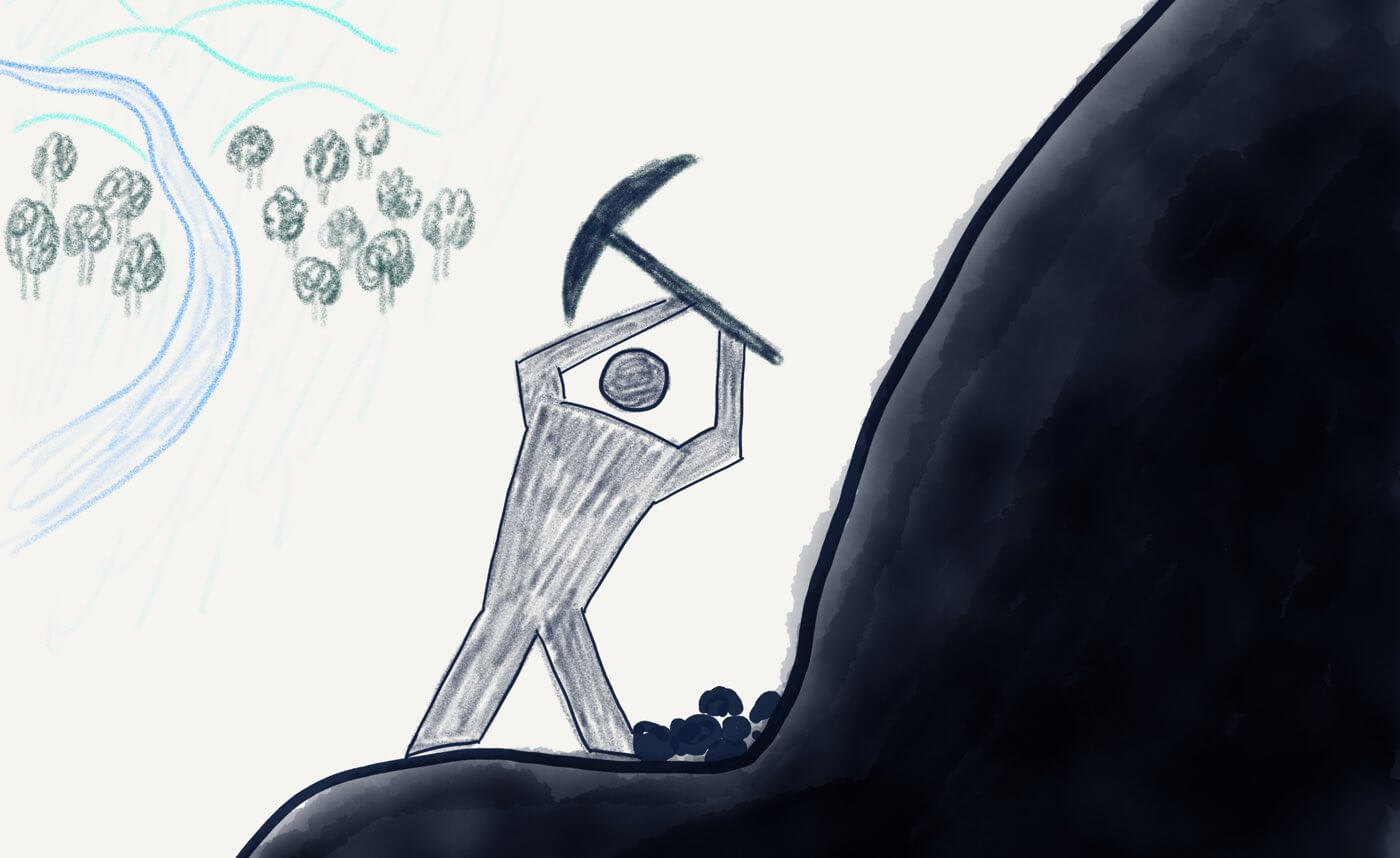Chances are you grew up hearing about the virtues of hard work—how it’s important to “always try your best” no matter what. Or how “hard work always pays off” in the end.
While commonplace and often well-intentioned, the belief in the absolute sacredness of hard work is misguided at best, and very often dangerous, for a simple reason:
Hard work is only valuable if it’s directed at valuable things.
Think about it:
- Is it good to work hard at being a jerk to people who think differently than you?
- Do you aspire to work hard at eating unhealthy food?
- Would you be happy if your child grew up to be a hard-working serial killer?
Yeah, obviously not.
Common, Nick! Anyone can cherry pick silly and extreme examples like that, but exceptions don’t disprove the rule. 99% of the time working hard is a very good thing!
Those examples are admittedly extreme. But the follies of unquestioned devotion to hard work are more common than you might imagine—and certainly more harmful.
Here are a couple real life examples from my own work as a psychologist to illustrate…
Working hard in a career you hate
By the time I met him, Scott had already had a long and successful career as a lawyer. After fifteen years of working his way up the ladder at a major law firm to reach partner, he had spent the last 10 years running his own firm even more successfully. He was extremely well off financially and had a sterling reputation among the legal profession in town. The problem was he hated his work.
The first time we met in therapy, Scott was surprisingly open about how he’d always resented his career. He told me how he came from a long line of hard-working lawyers in his family and got into it because it was “what you do in my family.”
Early on, Scott realized he had a knack for legal work but didn’t enjoy it at all and frequently found it distasteful and not especially interesting. He often dreamed of “just leaving it all” and starting over—a recurring “fantasy” he’d had since his first year of law school.
Scott was in therapy because he was depressed and it only seemed to be getting worse. He was also starting to drink more than usual (which was already a lot). And while his marriage and family life had “never been great,” his wife was threatening to divorce him. Perhaps worst of all, Scott was “just kinda hopeless.” When he looked forward, all he could see was 10 more years of working in a career he didn’t like, only to retire and not know what to do with himself.
Over the first weeks and months working with Scott, it became increasingly apparent to me that the real reason he came into therapy was to grieve. Scott was finally waking up to the fact that he’d spent the better part of his life pouring the best parts of his time and energy into something he didn’t enjoy or find meaningful:
- He was professionally successful—but he dreaded going to work every day.
- He had a beautiful house (several, in fact)—but he never got to appreciate them because he was constantly working.
- He had the esteem of professors, politicians, and judges—but his relationship with his wife and two kids was distant at best and very often contentious.
In short, Scott was coming to terms with the fact that he wasn’t living the life he actually wanted. As he put it even more starkly, “I’m afraid I’ve wasted my life.”
Listening to his story, it was hard for me to disagree.
Working hard to save an unhealthy relationship
Amy was attractive, clever, and wickedly funny. Within twenty minutes of our first meeting in therapy, she had me laughing out loud as she told humorous stories describing the shenanigans she and her younger brother got into as kids growing up in rural Arkansas. Unfortunately, her wit and talent for telling a good tale hid a much darker and painful side of her life.
Growing up, her father had been incredibly stern and hard on her as the oldest child. While never overtly abusive, Amy described him as a physical and moral “task-master,” constantly drilling into her and her younger brother a “Puritanical” view of the supreme importance of family and hard work above all else.
Her mother, on the other hand, was “shy and submissive,” frequently reminding Amy of the importance of “unity and harmony” in a family because, at the end of the day, “that’s all we’ve really got.”
Even though her family of origin took the spotlight in our first few sessions, it was clear from the beginning that the reason Amy was in therapy had much more to do with her current family, especially her relationship with her husband.
When I asked Amy to describe her marriage, he shrugged her shoulders and began with, “Oh, I don’t know—I guess we were happy in the beginning….” She went on to describe falling “madly” in love with her husband as sophomores in college and getting married a month after graduation. But quickly, she felt “empty and distant” in the relationship. Her husband worked long hours and didn’t seem very interested in spending much time with her when he did have free time—preferring golf with his work buddies or vacations with their best friends.
Pretty quickly, the distance and emptiness turned into conflict and resentment. Amy constantly tried to figure out why her husband wasn’t all that interested in her or their two young children. But the more she tried hard to figure it out and improve things, the more distant and irritable he became.
After 10 years of marriage, Amy discovered that her husband had been involved in a year’s long affair with her best friend—the one they vacationed with frequently. Amy was devastated. But almost immediately jumped into trying to repair things with the marriage and “find a silver lining.” She convinced her husband to try marriage therapy, but he only lasted two sessions before storming out at the beginning of the third session.
Amy came to see me because, while she was “desperate to save her marriage,” she didn’t know what else to do. She’d been pouring every ounce of her soul into trying to repair things with her husband, but their relationship only seemed to deteriorate further.
The inflection point in our work came after a couple months of weekly sessions. Amy was describing some recent argument with her husband about their kids when she all of a sudden burst into tears. After a couple of minutes of sobbing (which was unusual for the otherwise self-composed Amy), she told me “I hate that I have thoughts like this, but sometimes I wonder what it would have been like if I had married someone else.”
Of course, in my head I was thinking, Yeah no kidding! How could you not! But for Amy, who was so committed to working hard to save her marriage no matter what, simply having a thought like this was another sign of her own “weakness” and how she needed to find some way to “bring her family together.”
It seemed clear enough to me that Amy had married someone who was so narcissistic and self-centered that he simply wasn’t and never would be capable of a healthy relationship. But Amy’s entire worldview revolved around the unassailable importance of “working hard at family” and keeping people together.
After nearly a year of working together, nothing had really changed much for Amy. Realizing therapy had no magic solution for saving her marriage, she quit.
As far as I know, she continues to feel a near-constant stream of anxiety, guilt, and resentment about the state of her marriage. And beneath it all, in quiet moments when she’s alone with her own thoughts, a terrible sadness about the way her life turned out and how helpless she saw herself to change it despite (or perhaps because of) all her hard work.
Why hard work often backfires
If you read those examples closely, you likely noticed two big themes that run throughout them, both of which ought to make us more skeptical of an unquestioning instance on always working hard:
1. Opportunity Cost
Economists love to talk about opportunity cost, the idea that if you spend $500 on a new phone, you’re also giving up the chance to spend that $500 on a weekend getaway with your spouse, putting it into your child’s college fund, donating it to charity, or really anything else.
And whether you’re interested in economics or not, we’d all do well to keep this concept in mind as it applies just as much to psychology as finance.
While there are almost always benefits to working hard, we rarely pay attention to the costs. Specifically, we often fail to consider all the things we’re giving up when we devote our time, attention, energy, and even our love, into working hard at something that may not give us much return on that investment.
For example:
- All the time and energy Scott poured into his work was time and energy he didn’t invest in his relationship with his wife, his kids, or exploring a more fulfilling career path.
- All the time and energy Amy poured into her marriage was time and energy she didn’t invest in a different, healthier relationship.
And remember, it’s not just that our ROI on that hard work is low—the real problem is missing out on the much higher return on investment of our efforts if they had been directed toward something more worthwhile and genuinely valuable.
Which brings us to the second reason we ought to be more careful with our hard work…
2. Values Alignment
As we mentioned early on, hard work is only virtuous to the extent that it aligns with a worthwhile goal. The obvious example is something like our initial hypothetical of working hard at being a jerk. If the end state isn’t valuable, neither is working hard at it.
But the more subtle point here is that it’s easy to end up working hard at pseudo-values—things you think you should value, but really don’t. Or things other people value, but aren’t actually valuable or important to you.
And if you never question whether your hard work is aligned with your authentic values, it’s very easy to end up spending your life working hard at someone else’s life—a truly tragic occurrence which is all too common.
For example:
- Scott inherited the value of being a lawyer from his family. And because he never deeply questioned that value—whether it was actually something he valued—he ended up in my office confiding in me that he thought he had wasted his life.
- Amy inherited the value of working hard to keep family together no matter what. But it was never a value she seriously questioned to see if it aligned with her own wants, needs, and aspirations for her life. So she found herself trapped in a deeply unhappy and unhealthy marriage that she couldn’t bring herself to leave.
Hard Work Should Work for You… Not the Other Way Around
To be clear, I’m a big fan of hard work.
But over the years, I’ve seen far too many examples of how blind adherence to hard work can backfire and make people miserable. Specifically, when people don’t consider the opportunity costs of hard work and the values that work is aimed at, working hard quickly becomes an instrument of destruction and unhappiness.
The ability to work hard is a tool. And like any tool, it can be used well or poorly.
Even if you don’t find yourself in situations as intense as Scott or Amy, more ordinary decisions to work harder are worth reflecting on…
- What is it about taking home work on the weekends that feels so hard to give up? What value of mine is this hard work really aimed at? And what values am I giving up by working so hard on the weekends?
- Why do I feel compelled to dive in headfirst into working hard at yet another side project or hobby? Is this something that really aligns with my values or just another temporary distraction to keep my mind off something else?
- Why am I trying so hard to convince this person of what I believe? Am I considering the opportunity costs of all that time and energy? Do I actually care about changing their mind or does it make me feel good to appear to be the kind of person who “says it like it is”?
Remember…
Just because it’s hard doesn’t make it right.





13 Comments
Add YoursThank you for sharing this article Nick. It struck a deep cord with me. Both stories resonated with themes in my own life. My own background is in economics and I like the way you put opportunity cost into a personal context: every choice we make has a consequence and closes the door on other possibilities. I love your insightful articles.
Thank you, Miriam! I’m glad it resonated so well 🙂
dear Miriam, i understand and empathise and know so much as i am sure many other wise precious souls do where you are coming from, thankyou for this comment, i am very tired and very busy and woke up from a little nap – have had little sleep over the last few days and pain bugging me, taking pharmaceuticals, and right now free of pain yet so tired and so sad and have made mammoth efforts for futile and unhappy marriage that i am leaving and yet again relationship getting better with husband as separated from him and with much difficulty, have another place to live which is only temporary and unsure, i have made such mammoth efforts at futile marriage, and sometimes husband did aswell, and those who go – in self-righteous and stupid and unloving way – to stay in marriage – are so unwise and unkind, including ex boyfriend and former friend of my husband, and others who were fools, they are some of reason why i had to leave husband, – more about this, —– and he wants to get away from them too, and he advising me about breaking free of controlling people, i sure way agree, and he used to be one of them, how he is more now, if only he had been more than 25 years ago, i still love him, yet for so much evil that has happened in our lives and caused unhappiness to us and our children, whom we both love, we should never have married, at least we should have been free of evil fools who were controlling to me and me from both our sides then true little chance our marriage would not have been futile, God bless you and your Loved Ones and for all precious souls, husband and myself have two adults sons, one who died before birth – i believe he has Eternal Soul, and youngest son who has special needs who lives far away and longing for time i can have with him and missing him so much, i would throw away all the unhappy lost years of marriage just to have more time with youngest son and to be able to live with him and travel to wonderful places in england, ireland, germany, austria and other countries with him, but cannot go through time portal and star gate and do this………..
Nick, Your site generously gives encouragement and creative psychological tips. I am a seasoned psychotherapist and truly appreciate your insights and share them often with clients You are a credit to the field. Many thanks!
I really appreciate that, Deborah!
Like the earlier comments, I love your insightful articles. In the 2nd example, I can’t help but wonder if she just needed permission to see her husband as incapable of a healthy relationship. I know therapists aren’t supposed to be directive but in this case it may have helped her.
Thanks Laura. I think for her one issue was that while she understood than intellectually—that he wasn’t capable of a healthy relationship—coming to grips with understanding it experientially was a bridge too far. I certainly hope she was able to move forward eventually.
Nick,
I truly enjoy reading your weekly newsletter. You keep it real and relatable. You speak into issues that often don’t get talked about and offer a time of reflection. Many thanks to you for your work and your heart.
You’re very welcome, Sherry. Thank you for saying so 🙂
dear Mick Wignall, thank you for your wise and sad and helpful and true article, though i am busy with many things and woke up after a little nap because so overwhelmingly dog-tired and have slept badly for ages, because of lack of peace, lack of time, physical pain, and much sadness over many years, though sometimes have had wonderful peaceful sleep and hope to have more and be more deeply aware of true and wonderful and hopeful things with God, the little sleep i had was not that good and feel very low in spirits and though still have deep down peace in soul, much sad stuff bugging me, yet through all the sadness there are some good and wonderful things, and i have made mammoth efforts enduring truly and sadly much suffering because of unkind behaviour of husband and others, though many times husband was also kind and wise and he became more good altogether with more goodness in his soul since 2005 and he had more good thoughts about many things in the world and our lives and he became more kind and wise; yet ways he was horrible were so bad and it was his fault, he chose to be, yet he was also under oppression from untrue friends who were bad influence on him and i was under oppression from them and him, as i had been from unloving and violent family members who were horrible to my husband aswell, too much to go into, yet suffice to say, i made mammoth efforts and not only enduring and forgiving so much criminally unkind behaviour yet keeping on trying to make peace in marriage that was truly futile, that had so little chance anyway, and that small true little chance ruined by those of evil will who on purpose wrecked things, sadly also late mother who had knowingly behaved in evil unwise ways and had kept on forgiving her until she pushed me to wise and well overdue decision to finally disown her as she was disowning me, when she bullied our oldest sons though my younger brother chooses to idolise her and go with false history of her being wonderful as if all the bad stuff never happened, and he was treated cruelly by her aswell, ironically direct parallels with evil governments who have carried out atrocities with evil rubbish ways of thinking that lead to this and denied the evil things they have done and wrongly judged the victims only to carry on doing atrocities, many evil doers have used hard work of those who were brainwashed into going along with their evil ideologies and it has been hard mental work aswell as work in other ways to do much evil, and as it says in the Bible, the wages of sin are death, and well, some people have been working overtime at doing evil, most news channels reveal some of it, so well, let us not work hard on futile, or evil, things, and thankyou for this articles and all truth is liberating for those who use it wisely
Nick, another perspective;
As a creative, I’ve been working very hard through the years to find a creative medium that could be my livelihood. I’ve realized that though circumstances beyond my control didn’t make that happen, the journey was also about growing as an artist. As long as I was learning, and challenged by the variety of creative endeavors that fell my way, – I was happy.
I’m proud of the discipline working hard has given me, yet, I’m not beating myself up anymore that I didn’t make my goal. (though it’s never too late to keep trying). What I am proud of is keeping my curiosity intact to continue learning and growing as a person and an artist.
Thank you for this article Nick, as always, you’ve taught me valuable lessons that have helped me get through the day.
I love all your blogs Nick, and send them to my family and co-workers. I really liked this one except for Never Miss Twice. I wonder if using the word never sets us up to unrealistic standards that we are bound to not be able to meet. Moreover, I Interpret it to mean that there’s only one chance to miss and then we’re doomed – setting off again self flagellation. Anyway, just wanted to leave that thought here.
Hello everyone. Hi Nick.
I was working so hard for the last 2-3 years, and I saw consequences..All the time I had problems with relationships with not only my parents, but even with another people. I was really motivated to become rich in a couple of years..
And just a week ago, I read a book which told me the same things I read here. About hard work which leads to nothing.
Every rich guy was saying about “hard work..work hard..etc.” and they got richer, and I got nothing 😀 Now, when I finally stopped this, I realized, that there are other opportunities right now, and in that state of mind – when I started resting more I feel like I am doing more good decisions.
Only time will tell, but I guess we should be kind and gentle to our selves to become successful 😉